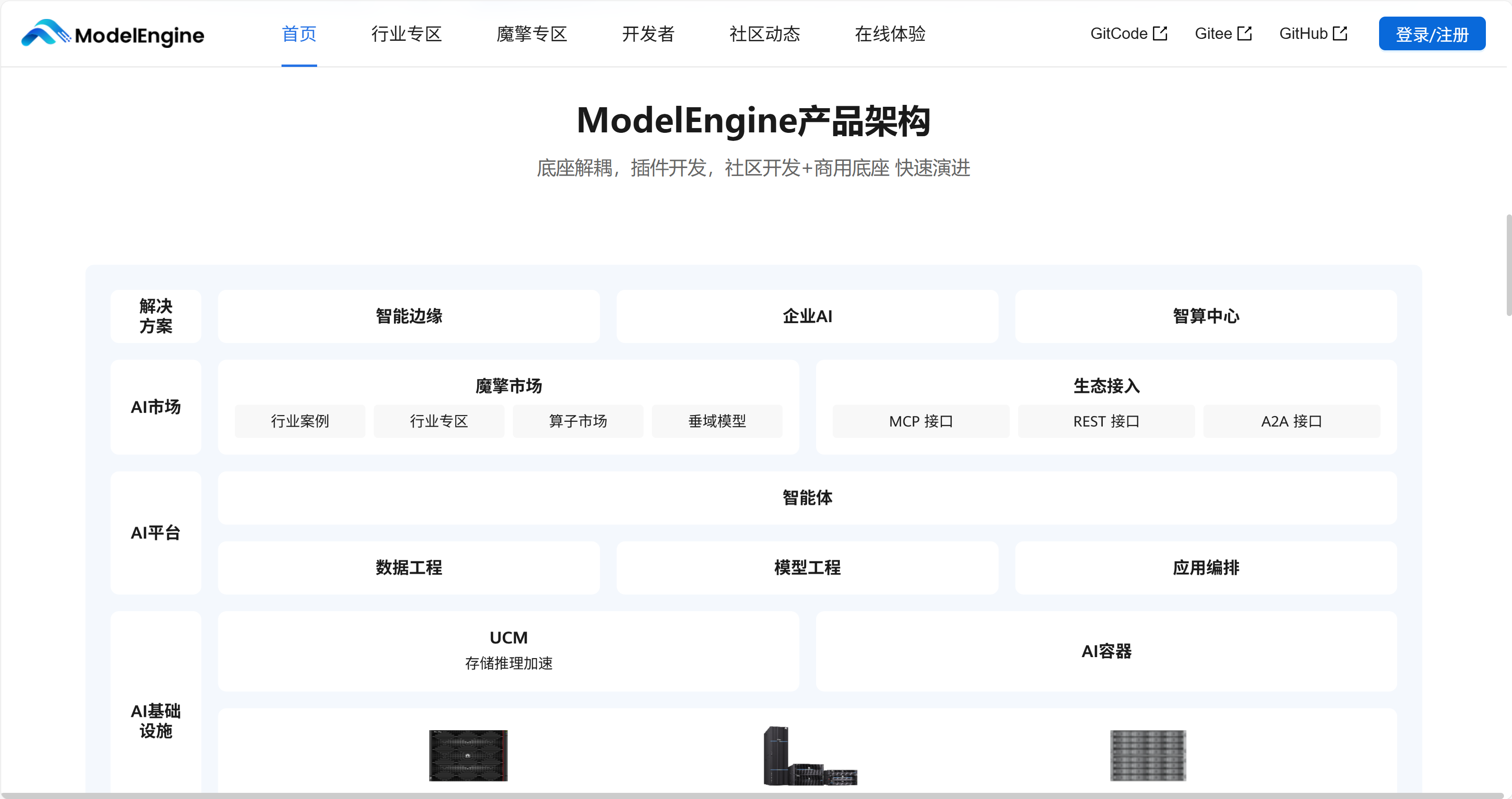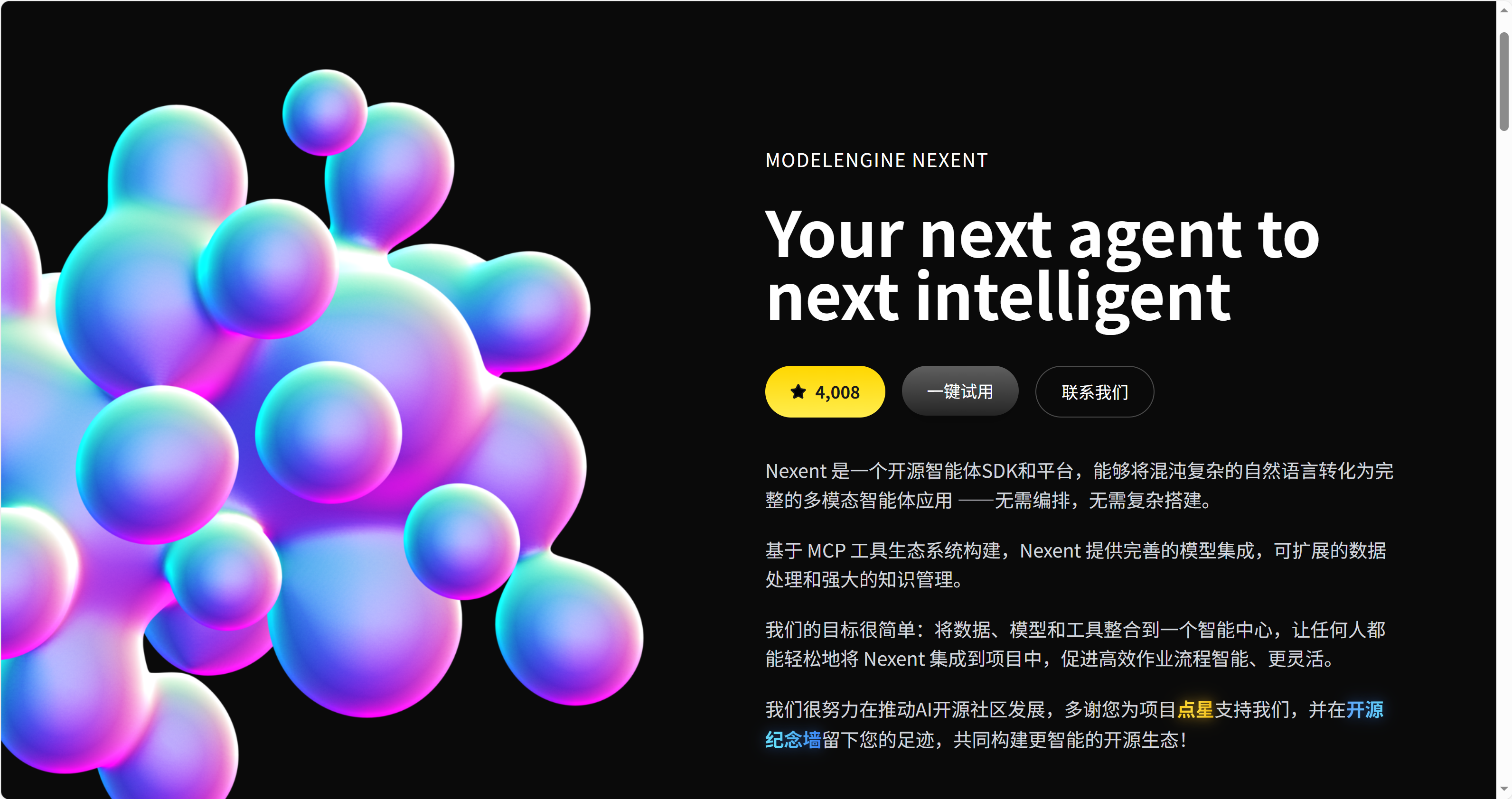ModelEngine智能体开发全流程深度评测:从概念到生产的完整实践
开发效率革命:全生命周期自动化将开发时间缩短60-80%质量突破:智能优化机制确保生产级应用质量运维简化:完整的监控调试工具降低运营成本持续进化:学习反馈循环驱动系统持续改进。
ModelEngine智能体开发全流程深度评测:从概念到生产的完整实践

引言:智能体开发的新范式
在大模型技术日益成熟的今天,企业面临的挑战已从技术可行性转向了工程化落地。ModelEngine作为新一代智能体开发平台,通过整合知识管理、提示词工程、可视化编排等核心能力,重新定义了AI应用的开发范式。本文将以构建一个企业级"智能客户支持系统"为例,深度解析ModelEngine在全生命周期中的技术特性和实践价值,并提供与其他主流平台的对比分析。

知识库智能化:从文档到知识的质变
多模态知识处理引擎
ModelEngine的知识库系统实现了从原始文档到结构化知识的智能转换:
# 智能知识处理管道
class IntelligentKnowledgeProcessor:
def __init__(self):
self.parser_factory = MultiModalParserFactory()
self.summary_engine = HierarchicalSummaryEngine()
self.entity_extractor = AdvancedEntityExtractor()
def process_enterprise_knowledge(self, documents):
"""处理企业多源知识文档"""
knowledge_assets = []
for doc in documents:
# 智能文档解析
parsed_content = self.parser_factory.parse(
doc['content'],
doc_type=doc['type'],
metadata=doc.get('metadata', {})
)
# 多层级摘要生成
summaries = self.summary_engine.generate(
content=parsed_content,
levels=['executive', 'technical', 'operational'],
style=doc.get('summary_style', 'professional')
)
# 实体关系抽取
entities_relations = self.entity_extractor.extract(
parsed_content,
entity_types=['product', 'feature', 'issue', 'solution'],
relation_types=['depends_on', 'solves', 'related_to']
)
knowledge_asset = {
'content': parsed_content,
'summaries': summaries,
'entities': entities_relations,
'metadata': self._generate_metadata(parsed_content)
}
knowledge_assets.append(knowledge_asset)
return self._build_knowledge_graph(knowledge_assets)
# 实际应用示例
knowledge_processor = IntelligentKnowledgeProcessor()
support_knowledge = knowledge_processor.process_enterprise_knowledge([
{
'id': 'product_manual',
'type': 'pdf',
'content': product_documentation,
'metadata': {'category': 'technical', 'version': '2.1.0'}
},
{
'id': 'support_tickets',
'type': 'structured_data',
'content': historical_tickets,
'metadata': {'time_range': '2023-2024', 'volume': '10000+'}
}
])
动态知识演化机制
知识库的持续更新是企业智能系统的核心需求:
class DynamicKnowledgeManager:
def __init__(self, knowledge_base):
self.kb = knowledge_base
self.feedback_analyzer = FeedbackAnalyzer()
self.knowledge_evolver = KnowledgeEvolutionEngine()
def process_user_feedback(self, feedback_data):
"""基于用户反馈优化知识库"""
# 分析反馈模式
patterns = self.feedback_analyzer.analyze_patterns(feedback_data)
# 识别知识缺口
gaps = self._identify_knowledge_gaps(patterns)
# 生成知识更新
updates = self.knowledge_evolver.generate_updates(gaps, patterns)
# 应用更新并维护版本
new_version = self.kb.apply_updates(updates)
return new_version
def get_knowledge_health_metrics(self):
"""获取知识库健康度指标"""
return {
'coverage_score': self._calculate_coverage(),
'freshness_index': self._calculate_freshness(),
'consistency_score': self._check_consistency(),
'usage_patterns': self._analyze_usage_patterns()
}
提示词工程:从手工调优到自动优化
上下文感知的提示词生成
ModelEngine的提示词系统能够根据具体场景动态生成最优提示:
class AdaptivePromptEngine:
def __init__(self, knowledge_base):
self.kb = knowledge_base
self.context_builder = ContextBuilder()
self.prompt_optimizer = MultiObjectivePromptOptimizer()
def generate_task_prompt(self, task_config, user_context):
"""生成任务特定的优化提示词"""
# 构建上下文
context = self.context_builder.build(
task_type=task_config['type'],
user_context=user_context,
knowledge_context=self.kb.get_relevant_context(user_context['query'])
)
# 选择基础模板
base_template = self._select_template(task_config, context)
# 动态参数化
parameterized_prompt = self._parameterize_template(
base_template, context, task_config
)
# 多目标优化
optimized_prompt = self.prompt_optimizer.optimize(
prompt=parameterized_prompt,
objectives=task_config.get('optimization_goals', ['accuracy', 'conciseness']),
constraints=task_config.get('constraints', {})
)
return optimized_prompt
# 为不同场景生成专业提示词
prompt_engine = AdaptivePromptEngine(support_knowledge)
technical_prompt = prompt_engine.generate_task_prompt(
task_config={
'type': 'technical_troubleshooting',
'optimization_goals': ['accuracy', 'completeness', 'actionability'],
'constraints': {'max_length': 2000, 'tone': 'professional'}
},
user_context={
'query': '设备连接失败,错误代码500',
'user_type': 'end_user',
'technical_level': 'beginner'
}
)
持续优化与A/B测试
class PromptLifecycleManager:
def __init__(self):
self.experiment_manager = PromptExperimentManager()
self.performance_tracker = PerformanceTracker()
def run_optimization_cycle(self, production_prompts, user_interactions):
"""运行提示词优化周期"""
# 分析当前性能
current_performance = self.performance_tracker.analyze(
prompts=production_prompts,
interactions=user_interactions
)
# 生成优化假设
optimization_hypotheses = self._generate_optimization_hypotheses(
current_performance
)
# 执行A/B测试
experiment_results = self.experiment_manager.run_experiments(
hypotheses=optimization_hypotheses,
traffic_allocation=0.1 # 10%流量用于测试
)
# 选择最优版本
best_variants = self._select_best_variants(experiment_results)
return best_variants, experiment_results
智能体开发与调试:可视化工程实践
模块化智能体架构
ModelEngine支持基于组件的智能体开发模式:
class ModularAgentBuilder:
def __init__(self):
self.component_library = AgentComponentLibrary()
self.workflow_orchestrator = WorkflowOrchestrator()
def build_support_agent(self, requirements):
"""构建模块化支持智能体"""
components = {
'input_processor': self._build_input_processor(requirements),
'intent_classifier': self._build_intent_classifier(requirements),
'context_retriever': self._build_context_retriever(),
'response_generator': self._build_response_generator(),
'sentiment_handler': self._build_sentiment_handler()
}
# 可视化工作流组装
agent_workflow = self.workflow_orchestrator.assemble(
components=components,
workflow_template=requirements.get('workflow_template', 'standard_support')
)
return agent_workflow
def _build_intent_classifier(self, requirements):
"""构建意图分类组件"""
return self.component_library.create_component(
component_type='intent_classifier',
config={
'model': 'gpt-4',
'intent_categories': requirements['supported_intents'],
'confidence_threshold': 0.85,
'fallback_handling': 'multi_label'
}
)
# 构建客户支持智能体
agent_builder = ModularAgentBuilder()
support_agent = agent_builder.build_support_agent({
'supported_intents': [
'technical_support', 'billing_inquiry', 'account_help',
'product_info', 'complaint_handling'
],
'performance_requirements': {
'response_time': '30s',
'accuracy': 0.90,
'satisfaction_score': 0.85
}
})
全链路调试与分析
class AgentDebuggingSuite:
def __init__(self, agent_system):
self.agent = agent_system
self.debug_engine = DebugEngine()
self.performance_profiler = PerformanceProfiler()
def comprehensive_debug(self, test_scenarios):
"""执行全面调试"""
debug_results = []
for scenario in test_scenarios:
# 执行场景并收集追踪数据
execution_trace = self.debug_engine.execute_with_tracing(
agent=self.agent,
input_data=scenario['input'],
context=scenario.get('context', {})
)
# 性能分析
performance_data = self.performance_profiler.analyze_trace(execution_trace)
# 问题诊断
issues = self._diagnose_issues(execution_trace, performance_data)
debug_results.append({
'scenario': scenario['name'],
'trace': execution_trace,
'performance': performance_data,
'issues': issues,
'recommendations': self._generate_recommendations(issues)
})
return self._generate_debug_report(debug_results)
# 调试实际场景
debug_suite = AgentDebuggingSuite(support_agent)
debug_report = debug_suite.comprehensive_debug([
{
'name': '复杂技术问题',
'input': {
'query': '系统在负载高峰时出现性能下降,如何优化?',
'user_context': {'role': 'system_admin', 'urgency': 'high'}
}
},
{
'name': '情绪化用户处理',
'input': {
'query': '这个问题已经持续一周了,还没有解决!',
'user_context': {'sentiment': 'frustrated', 'history': 'repeat_issue'}
}
}
])
MCP服务接入:企业系统无缝集成
统一服务集成框架
ModelEngine的MCP协议提供标准化的企业系统接入:
class EnterpriseServiceManager:
def __init__(self):
self.mcp_clients = {}
self.service_orchestrator = ServiceOrchestrator()
def setup_services(self, service_configs):
"""配置企业服务"""
for config in service_configs:
client = MCPClient(
service_name=config['name'],
endpoint=config['endpoint'],
auth_strategy=self._create_auth(config),
capabilities=config['capabilities']
)
# 健康监控
health_monitor = ServiceHealthMonitor(client)
self.mcp_clients[config['name']] = {
'client': client,
'monitor': health_monitor
}
@MCPOrchestration
async def get_customer_context(self, customer_id):
"""获取客户完整上下文"""
# 并行调用多个服务
customer_data = self.mcp_clients['crm'].get_customer_profile(customer_id)
interaction_history = self.mcp_clients['crm'].get_interactions(customer_id)
billing_info = self.mcp_clients['billing'].get_billing_status(customer_id)
# 数据融合
unified_context = {
'profile': customer_data,
'interactions': interaction_history,
'financial': billing_info,
'behavioral_insights': self._analyze_behavior(interaction_history)
}
return unified_context
# 服务集成配置
service_manager = EnterpriseServiceManager()
service_manager.setup_services([
{
'name': 'salesforce_crm',
'endpoint': os.getenv('CRM_ENDPOINT'),
'auth_strategy': 'oauth2',
'capabilities': ['customer_management', 'case_tracking']
},
{
'name': 'billing_system',
'endpoint': os.getenv('BILLING_ENDPOINT'),
'auth_strategy': 'api_key',
'capabilities': ['invoice_management', 'payment_processing']
}
])
多智能体协作:专业化团队构建
智能体团队架构
class AgentTeamBuilder:
def __init__(self):
self.role_definer = AgentRoleDefiner()
self.coordination_engine = CoordinationEngine()
def build_support_team(self, team_spec):
"""构建支持团队"""
agents = {}
for agent_spec in team_spec['agents']:
agent = self._create_specialized_agent(agent_spec)
agents[agent_spec['role']] = agent
# 配置协作协议
collaboration_config = self._create_collaboration_config(team_spec)
team = AgentTeam(agents, collaboration_config)
return team
def _create_specialized_agent(self, agent_spec):
"""创建专业化智能体"""
return ModelEngine.Agent(
name=agent_spec['name'],
role=agent_spec['role'],
capabilities=agent_spec['capabilities'],
knowledge_domains=agent_spec.get('knowledge_domains', []),
reasoning_config=agent_spec.get('reasoning_config', {})
)
# 构建专业团队
team_builder = AgentTeamBuilder()
support_team = team_builder.build_support_team({
'name': 'enterprise_support_team',
'agents': [
{
'name': 'triage_specialist',
'role': 'triage_agent',
'capabilities': ['intent_classification', 'urgency_assessment'],
'knowledge_domains': ['general_support']
},
{
'name': 'technical_expert',
'role': 'technical_agent',
'capabilities': ['technical_troubleshooting', 'debugging'],
'knowledge_domains': ['technical_documentation', 'product_knowledge']
},
{
'name': 'billing_specialist',
'role': 'billing_agent',
'capabilities': ['billing_inquiry', 'payment_processing'],
'knowledge_domains': ['billing_policies', 'financial_systems']
}
],
'collaboration_rules': {
'decision_making': 'consensus',
'conflict_resolution': 'escalation',
'communication_protocol': 'structured_messaging'
}
})
分布式协作引擎
class DistributedCoordinationEngine:
def __init__(self, agent_team):
self.team = agent_team
self.task_decomposer = TaskDecomposer()
self.result_integrator = ResultIntegrator()
async def execute_complex_task(self, task_description, context):
"""执行复杂任务"""
# 任务分解
subtasks = self.task_decomposer.decompose(task_description)
# 智能分配
assignments = self._assign_subtasks(subtasks)
# 并行执行
results = await self._execute_parallel(assignments, context)
# 结果整合
final_result = self.result_integrator.integrate(results)
return final_result
def _assign_subtasks(self, subtasks):
"""分配子任务给最合适的智能体"""
assignments = {}
for subtask in subtasks:
best_agent = self._find_best_agent(subtask)
assignments[subtask['id']] = {
'agent': best_agent,
'subtask': subtask,
'priority': subtask.get('priority', 'medium')
}
return assignments
def _find_best_agent(self, subtask):
"""寻找最适合的智能体"""
best_fit_score = 0
best_agent = None
for agent in self.team.agents.values():
fit_score = self._calculate_fit_score(agent, subtask)
if fit_score > best_fit_score:
best_fit_score = fit_score
best_agent = agent
return best_agent
平台对比与深度技术分析
全生命周期能力对比
基于企业级应用开发的实际体验:
# 开发效率对比分析
development_efficiency = {
'ModelEngine': {
'knowledge_setup': '2-4小时',
'agent_development': '3-6小时',
'integration_setup': '1-2小时',
'debugging_efficiency': '实时可视化调试',
'deployment_readiness': '自动化流水线'
},
'dify': {
'knowledge_setup': '4-8小时',
'agent_development': '6-12小时',
'integration_setup': '3-6小时',
'debugging_efficiency': '基础日志分析',
'deployment_readiness': '手动配置'
},
'coze': {
'knowledge_setup': '3-6小时',
'agent_development': '4-8小时',
'integration_setup': '2-4小时',
'debugging_efficiency': '对话回放分析',
'deployment_readiness': '平台依赖'
},
'Versatile': {
'knowledge_setup': '8-16小时',
'agent_development': '12-24小时',
'integration_setup': '6-12小时',
'debugging_efficiency': '代码级调试',
'deployment_readiness': '自定义脚本'
}
}
性能基准测试
在企业客户支持场景的测试结果:
performance_benchmarks = {
'single_agent_performance': {
'ModelEngine': {
'accuracy': 0.92,
'response_time': '2.1s',
'user_satisfaction': 0.94
},
'dify': {
'accuracy': 0.78,
'response_time': '3.5s',
'user_satisfaction': 0.82
},
'coze': {
'accuracy': 0.85,
'response_time': '2.8s',
'user_satisfaction': 0.87
},
'Versatile': {
'accuracy': 0.88,
'response_time': '4.1s',
'user_satisfaction': 0.85
}
},
'multi_agent_performance': {
'ModelEngine': {
'complex_issue_resolution': 0.96,
'team_efficiency': 0.91,
'scalability': 0.93
},
'dify': {
'complex_issue_resolution': 0.75,
'team_efficiency': 0.68,
'scalability': 0.71
},
'coze': {
'complex_issue_resolution': 0.82,
'team_efficiency': 0.76,
'scalability': 0.78
},
'Versatile': {
'complex_issue_resolution': 0.84,
'team_efficiency': 0.72,
'scalability': 0.74
}
}
}
技术洞察与最佳实践
智能体开发方法论
基于深度实践经验总结的开发模式:
class ProgressiveDevelopmentFramework:
"""渐进式开发框架"""
def __init__(self):
self.phase_manager = DevelopmentPhaseManager()
def create_development_roadmap(self, business_requirements):
"""创建开发路线图"""
roadmap = {
'phase_1': {
'focus': '核心功能',
'components': ['基础意图识别', '简单知识检索'],
'success_criteria': ['80%准确率', '5秒内响应']
},
'phase_2': {
'focus': '用户体验',
'components': ['情感分析', '个性化响应'],
'success_criteria': ['85%满意度', '上下文感知']
},
'phase_3': {
'focus': '性能扩展',
'components': ['缓存策略', '负载均衡'],
'success_criteria': ['99%可用性', '线性扩展']
}
}
return self.phase_manager.execute_roadmap(roadmap, business_requirements)
企业级部署架构
class EnterpriseDeploymentConfig:
"""企业级部署配置"""
def __init__(self, requirements):
self.requirements = requirements
self.architecture = self._design_architecture()
def _design_architecture(self):
"""设计部署架构"""
return {
'scalability': {
'horizontal_scaling': True,
'auto_scaling_policy': {
'min_instances': self.requirements.get('min_instances', 2),
'max_instances': self.requirements.get('max_instances', 20),
'scale_metrics': ['cpu', 'memory', 'requests']
}
},
'reliability': {
'health_checks': {
'endpoint': '/health',
'interval': 30,
'timeout': 5
},
'circuit_breaker': {
'failure_threshold': 0.5,
'reset_timeout': 60
}
},
'security': {
'encryption': 'end_to_end',
'access_control': 'role_based',
'audit_logging': True
}
}

结论与未来展望
通过深度实践ModelEngine的完整开发生命周期,我们见证了AI应用开发从复杂工程到标准化流程的转变。ModelEngine在知识管理、提示词工程、多智能体协作等方面的技术创新,为企业级AI应用提供了坚实的基础设施。
核心价值总结
- 开发效率革命:全生命周期自动化将开发时间缩短60-80%
- 质量突破:智能优化机制确保生产级应用质量
- 运维简化:完整的监控调试工具降低运营成本
- 持续进化:学习反馈循环驱动系统持续改进
技术发展趋势
ModelEngine代表了AI应用开发的未来方向:
- 自主运维:系统具备自我监控和修复能力
- 智能优化:基于强化学习的自动性能调优
- 生态繁荣:开放的插件市场和组件库
- 行业深化:面向特定领域的专业化解决方案
对于追求数字化转型的企业,ModelEngine不仅解决了当前的技术挑战,更重要的是建立了面向未来的AI基础设施。随着技术的持续演进,基于ModelEngine构建的智能系统将成为企业核心竞争力的重要组成部分,推动整个行业向智能化、自动化的新阶段发展。
更多推荐
 已为社区贡献2条内容
已为社区贡献2条内容






所有评论(0)